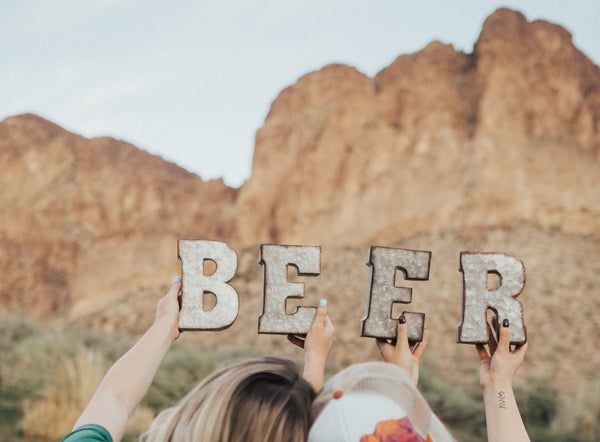This article was published in Scientific American’s former blog network and reflects the views of the author, not necessarily those of Scientific American
If you spend ten minutes with geologists, you'll notice most of them absolutely love two things: rocks and beer. Sometimes in that order.
For most of us, alcohol never becomes a problem. We can sit back and have a few, or not; our drinking is limited to social situations or just one or so beers a day; if we stop drinking, we don't suffer physical or psychological withdrawal. But some of us aren't wired that way. We're prone to addiction, and one beer soon turns into too many. Or we're suffering from an underlying mental illness, and self-medicating. We may not even realize that's what we're doing. We just get to a point, one day, where either we or our loved ones realize we have a serious problem.
This is heavy on my mind lately because I have a dear friend who's currently in inpatient, battling alcohol addiction. The fact alcohol is freaking everywhere, and is such a part of our culture that you can't even get away from it at professional meetings, makes getting sober horribly difficult. What makes achieving sobriety even tougher is how focused our recovery plans are on Alcoholics Anonymous.
On supporting science journalism
If you're enjoying this article, consider supporting our award-winning journalism by subscribing. By purchasing a subscription you are helping to ensure the future of impactful stories about the discoveries and ideas shaping our world today.
I'll state this up front: if you've stayed sober with the help of AA, I'm glad. You were one of the lucky ones it works for. But, despite what I've heard my friend being told in AA meetings, it's hardly the only way to recover, and it doesn't work for everyone, even if they're very motivated to get sober.
For all the success stories with the 12 steps, there’s also many of disappointment.
The biggest sticking point seems to be the 12 steps’ spiritual element. Critics such as Maia Szalavitz, an addiction journalist and author of Unbroken Brain: A Revolutionary New Way of Understanding Addiction, have focused on this part of the program to argue that the 12 steps really shouldn’t be considered treatment at all.
“Let’s say you go to a doctor to get your depression treated,” Szalavitz told me. “If they told you that you had to surrender to a higher power, address your character defects, make a moral inventory, [and] pray, you would probably think that you had gone to a quack.” She added, “If we’re going to argue, as the 12-step people strenuously do, that addiction is a disease, it cannot be the only disease for which the treatment is confession and prayer. That’s just not acceptable.”
Many of us, probably a majority, in the scientific community are either agnostic or atheists. Our loved ones, too, may not be religious. AA loves to proclaim that your higher power can be anything, and that they can totally be secular, but most meetings are heavily focused on religion. That doesn't work for people who aren't believers and can't take a higher power seriously. We need secular solutions.
Fortunately, we're in an era where secular recovery options are only a click away.
SMART Recovery is a secular recovery program that has meetings worldwide, plus a lively online community for those who can't make it to an in-person meeting. My friend found their videos extremely helpful: I watched him go from hopeless to enthusiastic about recovery in the course of an evening, and he kept that optimism going into inpatient. They use Rational Emotive Behavior Therapy (REBT), which has proven successful in helping people deal with mental health and behavioral issues.
LifeRing Secular Recovery also offers online and in-person meetings. It's an outstanding source of support from peers. There's a lot of emphasis on relying on yourself to get to sobriety, which is a great model for those who need to regain that faith in themselves.
I've had friends who have used both of these programs with resounding success.
Don't be afraid to take the tools from AA that work for you, and then take your toolbox over to round it out at SMART Recovery or LifeRing. Don't be afraid to pass over AA entirely, if you find it's a waste of your time. There are many paths to recovery, and you will find one that works for you. Don't give up if the first path you go down doesn't end in recovery: there are other options out there, and plenty of people who will help you navigate them.
In my next piece on this subject, I'll talk about what to look for in a good residential recovery program, and how to get the most out of it.
